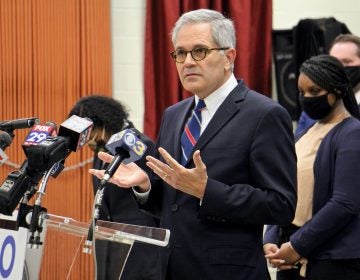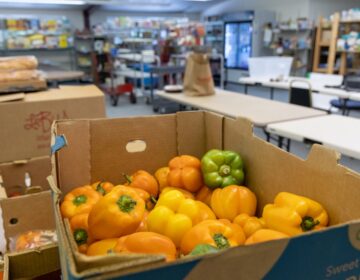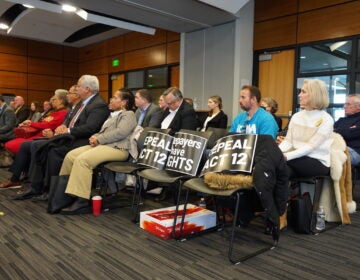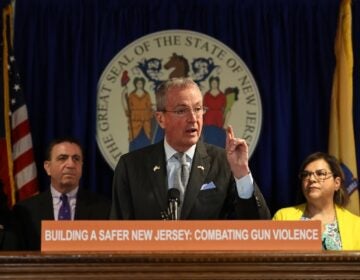Assessing the ways Chester’s Partnership for Safe Neighborhoods program has succeeded
Local, county, and state officials touted the results since the Nov. 2020 launch, including fewer incidents of gun violence.
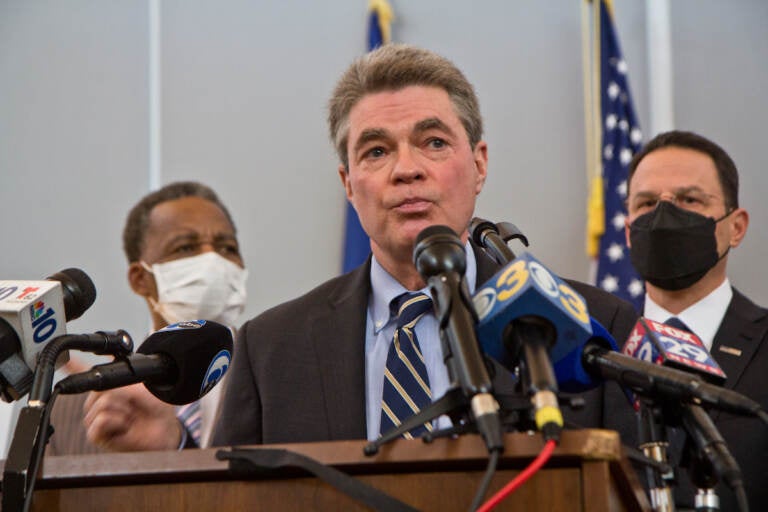
Delaware County District Attorney Jack Stollsteimer speaks at a press conference on Jan. 11, 2022. (Kimberly Paynter/WHYY)
Local, county, and state officials gathered Tuesday to tout the success of the city of Chester’s Partnership for Safe Neighborhoods in lowering gun violence rates since its launch in November 2020.
The program uses a method called “focused deterrence” that targets individuals the Chester Police Department identify as most at risk — people who it believes are causing most of the violence.
Then the program uses a “carrot and stick” approach: Through community liaisons, the Delaware County District Attorney’s Office points to community resources like job training, education, and mental health support. But if those “at-risk” individuals don’t accept the offers, the police follow up with swift repercussions.
“So we’ll help you if you take it. But we’re going to stop you if you make us,” District Attorney Jack Stollsteimer said at a roundtable discussion on the program.
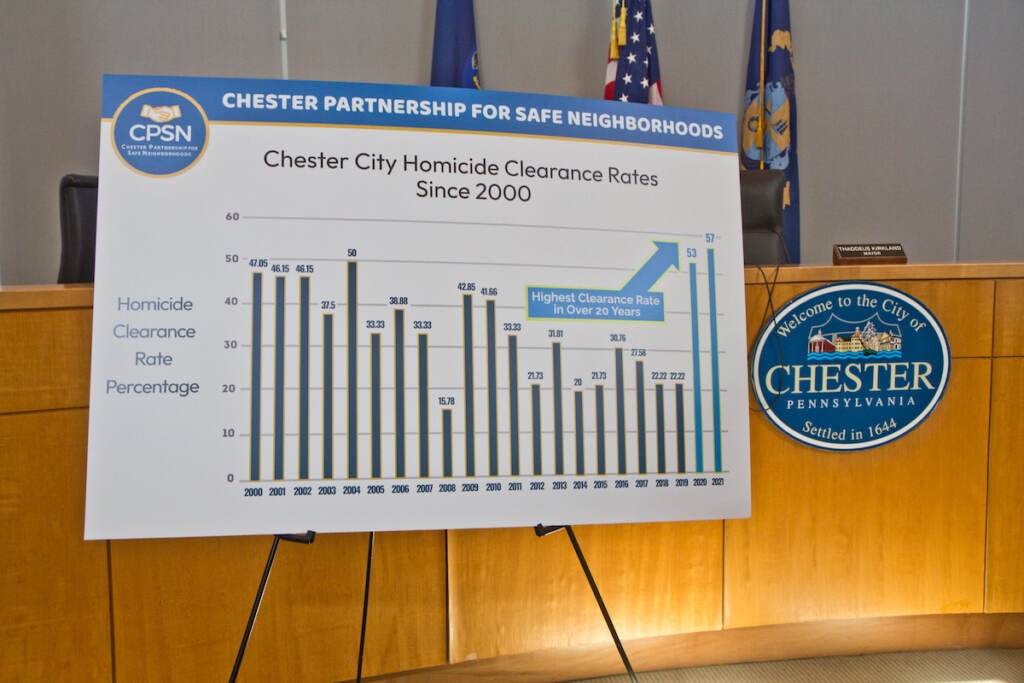
According to Chester Mayor Thaddeus Kirkland, since 2020 the city has seen a 44% decrease in gun violence homicides and a 34% decrease in overall shootings with victims. In 2020, there were 34% fewer shooting incidents compared to 2016.
In 2021, the first full year of the program, there were 42 fewer shooting incidents compared to 2020 — 80, down from 122 — and 88 fewer shootings compared to 2017, when there were 168 shootings.
The Chester Police Department and the Delaware County Criminal Investigative Division collaboratively have a 57% clearing rate for all homicides in 2021.
“When we get to zero, then we begin the process of jumping up and down. But we do want to tell you that progress is being made,” Kirkland said.
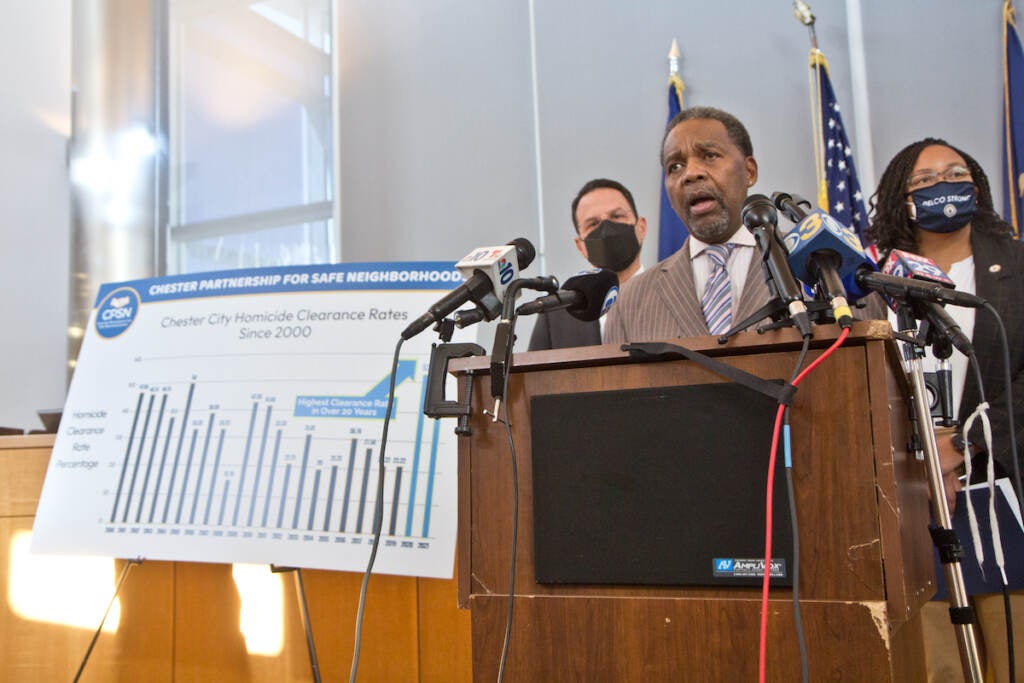
Pennsylvania Attorney General Josh Shapiro said Chester is experiencing an “unprecedented level of coordination and cooperation between the District Attorney’s Office, the police, and City Council members.
“Everybody’s rowing in the same direction,” said Shapiro.
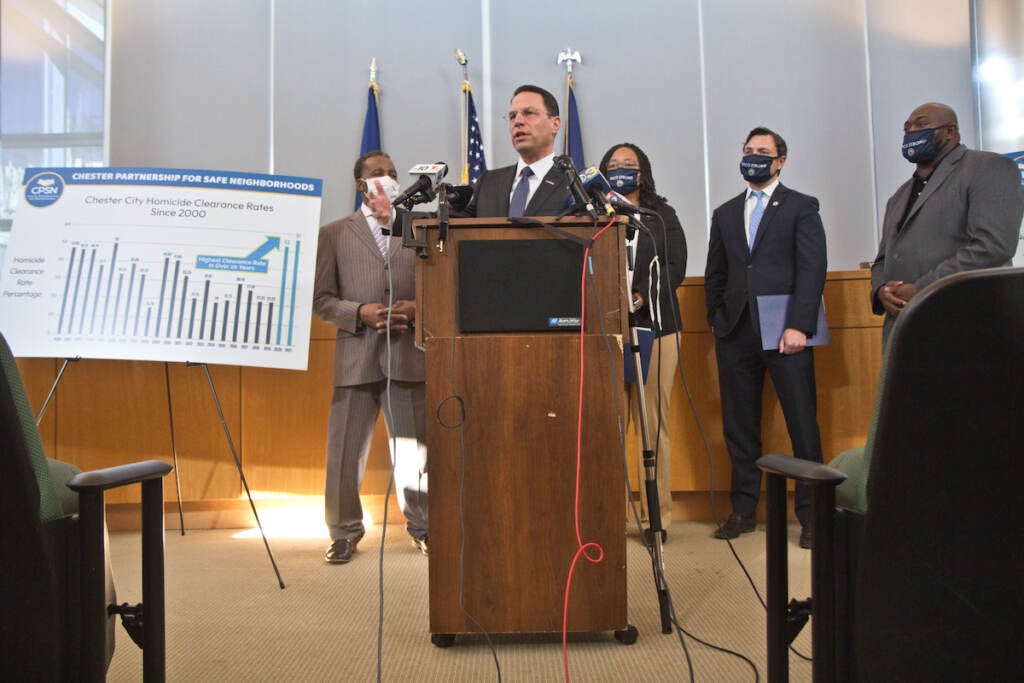
He also said the Chester Police Department needs more funding, about 50 more police officers, and more tools to recruit officers.
Shapiro has been calling on the state legislature for the past eight months to authorize an emergency fund of $28.5 million for police departments across Pennsylvania.
Kirkand said that the city needs more than 50 police officers, but that the success of the program comes from collaborations between the community liaison and community organizations.
“Working with these partners within the very community, not just sitting behind the desk, writing out numbers or writing out scripts but actually getting involved in the lives of these young people. That’s what makes the difference,” said Kirkland.
Stollsteimer said Chester needs more mental health services and supportive resources.
“It’s often just a problem of connecting them to the service, but then getting them to want to take it,” added Stollsteimer.
Jean-Pierre Brice is the sole community liaison for the program. In an interview Tuesday afternoon that took place after the roundtable event, Brice said that so far he has connected three individuals to community resources through the program’s referrals, and 15 individuals on his own accord.
According to Brice, the city has had one call-in meeting since the start of the program. That means Chester has met face-to-face with one group of individuals who it deems to be “high-risk.”
He said it’s hard to convince people to get involved in the program because of his association with the district attorney and community distrust of the police. That’s why, he said, he connects with more people on his own, not people who are referred to him through the DA.
Brice was incarcerated as a young man and uses his experiences to connect with young men in Chester. He thinks of it as offering unconditional love.
“I know how it feels to be lost,” he said. “Just having somebody that can call you on the phone and talk to you and give you a word of advice or uplifting word. That means a lot.”
Brice said he points individuals to mental health resources and helps them prepare for job interviews. He also helps them tackle the obstacles that often come after incarceration, things like getting their driver’s licenses back and their records expunged.
He also offers emotional support. Sometimes, that means buying a meal or buying a pair of sneakers. He said he is mostly focused on young men 17 to 19 years old.
“It’s hard to reach the high-level drug dealer, trying to change his life. You almost have to leave him out there by himself,” said Brice, “It’s like chess, you take the pawns off the board, then you work on the bigger pieces.”
Carol Kazeem has lived in Chester for over 20 years. A community advocate who works with a number of local organizations, Kazeem said she believes Brice and the nonprofits working in collaboration with the police are the reason for the crime rates going down.
“It’s a collaborative effort, and the answer to [gun violence] was not police officers,” said Kazeem.
To further combat gun violence in the community, she said, the city needs to increase collaboration with local nonprofits such as the Chester Peace Initiative, the Chester Community Coalition, the Chester Healing Project, and community leaders like block captains.
Those nonprofits offer support services to families suffering from trauma, support for kids who might not have a lot of familial support, mental health resources, and gun violence intervention programs.
Kazeem said she would like to see the DA work with more community liaisons like Brice, people from the community who are fully invested in the betterment of Chester. The city also needs more officers that are from Chester, and are devoted to connecting with community members, she said.
For Brice, long-term solutions involve getting residents of Chester to help themselves. It starts, he said, with encouraging young men to help their neighbors and family members.
“These little things that you start to do inside of your family … then it reaches out into the community. People start giving, [they] come outside, [they] clean up their neighborhood.”
 WHYY is one of over 20 news organizations producing Broke in Philly, a collaborative reporting project on solutions to poverty and the city’s push towards economic justice. Follow us at @BrokeInPhilly.
WHYY is one of over 20 news organizations producing Broke in Philly, a collaborative reporting project on solutions to poverty and the city’s push towards economic justice. Follow us at @BrokeInPhilly. WHYY is your source for fact-based, in-depth journalism and information. As a nonprofit organization, we rely on financial support from readers like you. Please give today.



